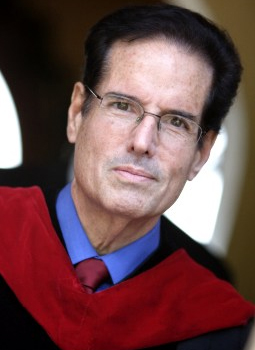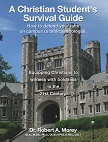Introduction to Journal of Biblical Apologetics
Is Natural Theology Fideistic?
By Dr. Robert A. Morey
The question posed above may be shocking to some Evangelicals. It may even be viewed as outrageous to ask such questions. The typical smug response is:
"Why, everyone is into natural theology today. Our favorite apologists are all supporters of it. In countless radio shows, seminars, books, and tapes we are challenged to choose between "faith or reason." And, who would be so stupid as to choose faith over reason? To choose faith instead of reason would mean that Christianity is based on ignorance and a blind leap of faith. Thus all intelligent Christians are agreed that Reason is the basis of Christianity."
Of course, the issue is NOT between man's "reason or faith" but between "reason or Revelation." The humanistic apologist begins and ends a priori with some aspect of fallen man as the Origin of truth. Thus he assumes that we must choose between man's reason, man's emotions, man's faith or man's experience. "God" is not on the humanist menu.
Professing Christians who are humanistic apologists and philosophers are fideists in the classical sense of starting from blind faith. They have blind faith in human Reason as the Origin of truth, justice, morals, and beauty. If you challenge their faith in human Reason as the measure of all things including God, they end up arguing in circles.
Christian Humanist: Through human reason we can demonstrate the truth about the existence and attributes of God. Such issues as evil, time, and eternity can be answered apart from and independent of the Bible. Man can use his reason to figure out theology and philosophy.
Christian Theist: You must have a lot of faith in human reason to make such assertions. What is the basis of your faith in human reason? On what grounds do you believe in human autonomy? Isn't your faith a "leap in the dark?"
Christian Humanist: Are you accusing me of being a fideist? Reason, not faith, is the basis of truth! People like Van Til, Schaeffer, Clark, Frame, Morey, etc. are fideists. Not me.
Christian Theist: What is a fideist?
Christian Humanist: Oh, that is a dirty word in philosophy and theology. It refers to those who are ignorant of philosophy and who view their faith as the basis of what they believe. Most uneducated Christians are guilty of it.
Christian Theist: But don't you have faith in human reason and in human autonomy? Don't you believe in starting from man, not from God? Thus you base your theology and philosophy on faith in yourself?
Christian Humanist: Well, of course I do. All great philosophers and theologians believe in natural theology. They all began with themselves. Haven't you read Plato, Aristotle or Aquinas?
Christian Theist: Oh, I see that your faith is based on Argumentum ad Populum. A philosopher or theologian is "great" only if he is humanistic? Aren't you stacking the deck? Aren't you appealing to the authority of pagan philosophers?
Christian Humanist: Reason tells us that reason is the Origin. Get with the program.
Christian Theist: Ah, so we arrive at last at your fideism. You believe in reason because reason tells you to.
Christian Humanist: How dare you charge me with fideism!
Christian Theist: Look, you believe in "reason" because "reason" tells you to believe in it. Isn't that circular reasoning? You appealed to the gallery and to the authority of pagan philosophers. Your faith in reason is thus irrational and a leap of faith on your part. How is it that you can appeal to the uninspired authority of Aristotle or Aquinas and, yet, if I appeal to the inspired authority of Paul or Isaiah, you would decry my appeal as fideism?
Christian Humanist: This is not how the game is played! Are you saying that you start from God's Revelation instead of man's reason or faith?
Christian Theist: Yes! By George, I think he's got it.
Christian Humanist: But, if you begin with God and his Word instead of with man and his reason, this would make us slaves to the Bible. In order for man to be truly free, he must be free from God and the Bible.
Christian Theist: What you just said is what Satan told Adam and Eve in the Garden:
"You must break free from God's Word. Make up your own mind what is right and wrong, true and false. If you must choose between what God says and what you think, go with your own reason."
I prefer what Paul said, "Let God be true even if this means every man is a liar." The biblical apologist begins with God's Revelation in Scripture. It is more reliable than even first-hand eyewitness accounts according to 2 Peter 1:16-21. When someone states that the issue is between "reason or faith," he has been brainwashed by humanism. The issue is between God or man, i.e. God's Revelation or man's reason, experience, emotions or faith.
Christian Humanist: That is absurd. We all have to begin with ourselves, our own ideas, and our own reasoning abilities.
Christian Theist: Don't use the fallacy of equivocation on me. By "begin with" or "start from," I mean that God's Word is the ultimate Judge or Origin of truth and morals. We all use our reasoning abilities every day. Being rational and being a "Rationalist" are two different things.
Christian Humanist: But we must begin, not with the Bible, but with general revelation found in nature. Look in Rom. 1 and Psa. 19. Read it and weep!
Christian Theist: My friend, can't you see you have just refuted yourself?
Christian Humanist: How?
Christian Theist: To prove that we should not begin with the Bible--you begin with the Bible? To justify not starting from Scripture - you start by quoting it! You just slit your own throat. Indeed, without the Bible, you would not even have the idea of general revelation. When you run around trying to prove the existence and nature of God from reason alone, what "God" are you talking about?
Christian Humanist: What do you mean, "What God?"
Christian Theist: Are you trying to prove the existence of the "God" of the Qur'an, the Vedas, the Book of Mormon, the Divine Principle?
Christian Humanist: Duh! I am referring to the God of the Bible, not the God of the Vedas or the Qur'an.
Christian Theist: Once again you start with the Bible and you begin with the God who revealed Himself in it. You have been so saturated with biblical ideas of God, man, sin, creation, revelation, etc. that you are incapable of starting without the Bible. The only ones who can truly start from their own reason apart from the Bible are the heathen who never heard of the Bible or any of the religions which refer to it. Such a person must be in total isolation from Judaism and Christianity, and any religions that borrowed material from those religions. When we look in history to see what isolated heathens have deduced from nature using their reason, we find nothing but gross idolatry and immorality. Thus natural theology is a complete bust. It has never worked in the past and it will never work in the future. It is unlikely you will ever meet someone who has been totally isolated from the Bible. The "heathen" today are generally those who have heard the Word but reject it.
Christian Humanist: You mean I cannot be objective and neutral in using reason alone to find God because all those words and concepts have a biblical meaning?
Christian Theist: Yes. Those apologists and philosophers who do not admit this are either ignorant or deceptive. If you are a Christian, you cannot free yourself from all the ways the Bible has influenced your thinking. It is impossible for you to begin with yourself apart from the Bible when your "self" has already been influenced by the Bible.
_ _ _ _ _ _ _ _ _ _
The assumption that theology, philosophy, and apologetics can be derived from human Reason apart from special Revelation needs to be examined carefully because many of those who were the loudest supporters of it in the last 25 years have, by and large, become apostate. The forbidden fruit of natural theology has proven to be very poisonous indeed.
Clark Pinnock is a good example of this ugly reality. He began as an ardent defender of the inerrancy of Scripture. We remember with fondness his lectures and books in support of Sola Scriptura.
Beginning in the 70's, there was an epistemological revolution in Pinnock's thinking and he became a great supporter of natural theology. In the end, he joined the Communist Party in Canada, denied the omniscience, omnipotence and sovereignty of God, attacked the eternal conscious punishment of unbelievers in hell, rejected the doctrine of original sin, questioned the Pauline authorship of Ephesians and that Daniel wrote Daniel, and finally denied that it was necessary to hear of and believe in Jesus Christ to be saved. Each time he betrayed a biblical truth, he did so in the name of "Reason."
Pinnock is only one of a very long line of neo-Evangelicals in the later half of the 20th
century who have betrayed Christ. Some of my seminary professors and fellow theological students who started out in the Faith came to despise it. Franky Schaeffer's apostasy grieved us deeply. Almost without exception, the slippery slope to apostasy began when they abandoned Sola Scriptura and adopted sola
ratione.
Once they made the blind leap of faith that man can discover the existence, nature and attributes of God by human Reason apart from the special Revelation found in Scripture, they developed "natural" apologetics based on human Reason. Man was now the measure of all things including God!
From natural apologetics, they slid down the slope to the idea that if man can know God apart from the Bible, then he can make it to heaven without the Bible. If the Bible is not needed, then repentance toward God and faith in Jesus Christ are not needed either. Thus the heathen are not lost. They do not need to hear of or believe in the gospel. Natural theology inevitably leads to natural salvation.
Of course, there are a few natural theologians who, at this time, are still orthodox to some extent. Residual pietism left over from their evangelical phase emotionally prevents them from sliding all the way down the slope. But their students do not have any pietism to hold them in check. Those who sow the seeds of natural theology frequently see their students reap the whirlwind of apostasy.
The Roman Catholic Church was led into natural theology by the heretical Thomas Aquinas. It was officially adopted at Vatican I and is very visible in the New Catholic Catechism. Why some Protestants choose sola ratione over Sola Scriptura can be traced to various philosophical, moral, and psychological causes, none of which are noble.
The first edition of the Journal of Biblical Apologetics will examine the origin, nature, and defects of natural theology and issue a clarion call to return to our biblical roots and
Evangelical heritage.
Dr. Robert A. Morey
Editor
FAITH DEFENDERS Website: www.faithdefenders.com






































